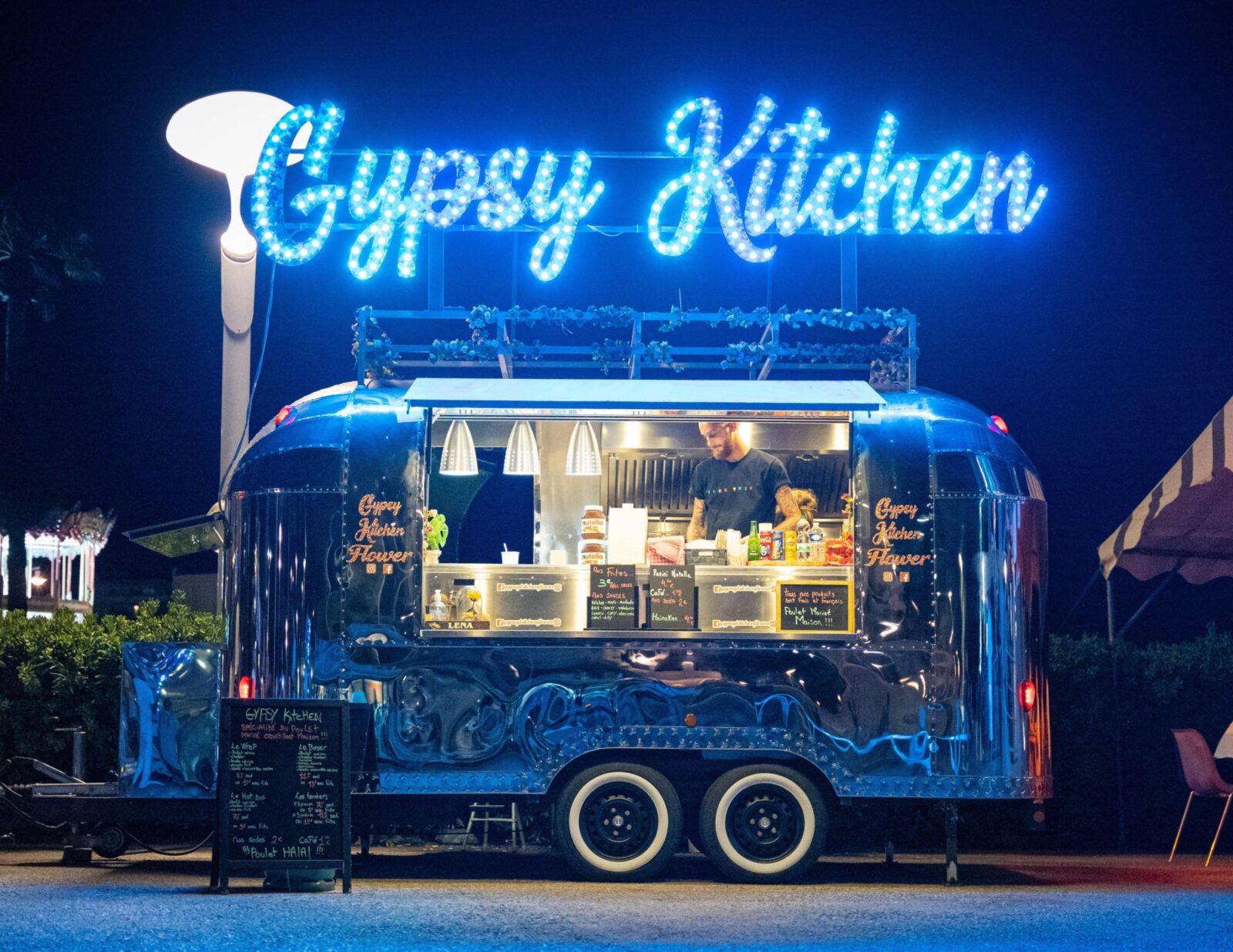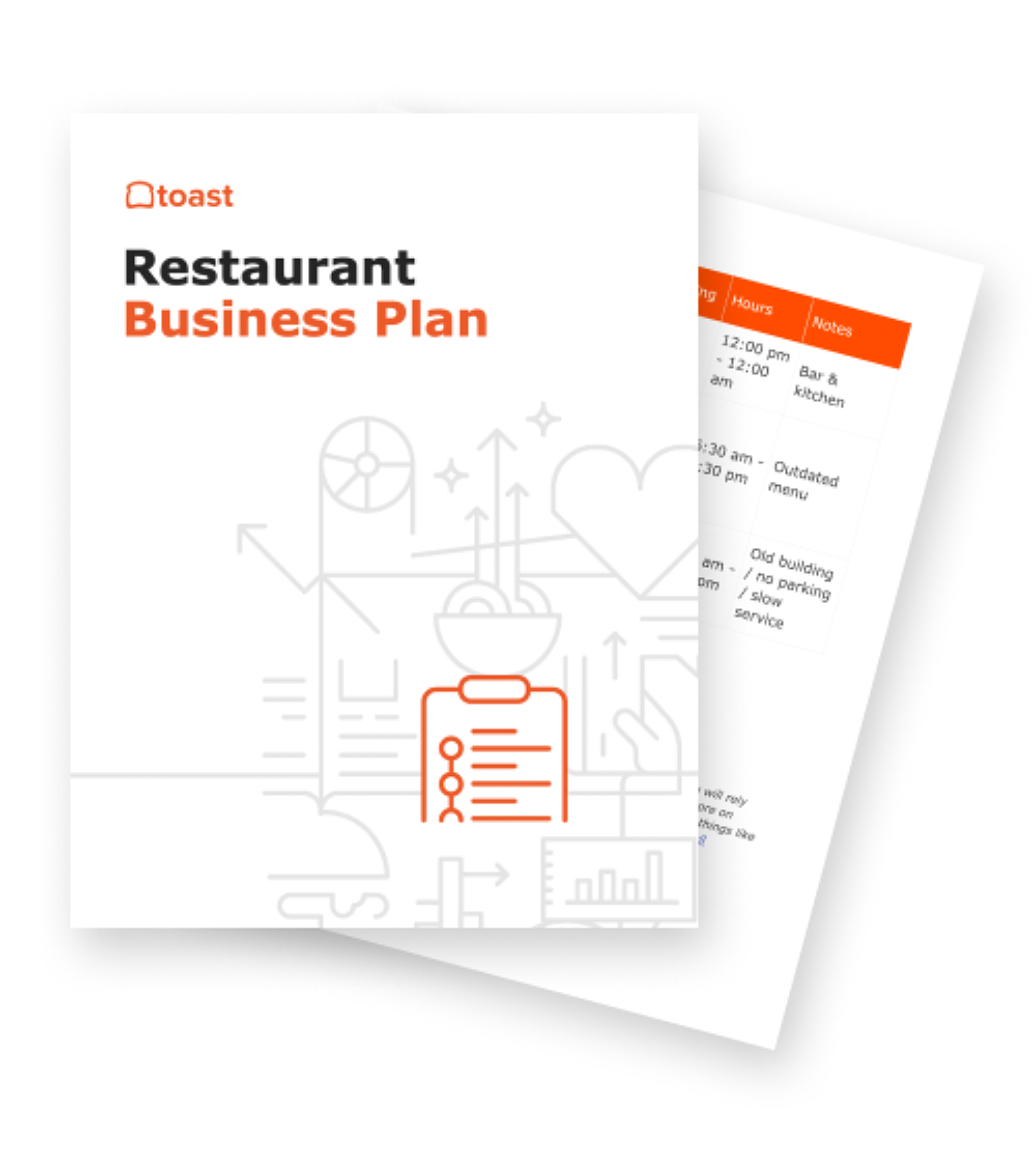
12 Licences and Permits Needed to Open a Food Truck
To open a new food truck business, you’ll need to track down the permits and licences required to operate. Here’s how to get started.

Katherine BoyarskyAuthor


Restaurant Business Plan Template
No matter where you’re at in your restaurant ownership journey, a business plan will be your north star. Organise your vision and ensure that nothing is overlooked with this free template.
Get free downloadHere are the food truck licences, inspections, and permits you need to open your new restaurant on wheels, and where you can find them for your area.
It’s not enough to have a food truck idea or concept and a standout truck design. In order to operate legally, you’ll need a detailed business plan, and permits and licences specific to mobile food and beverage establishments. For example, if you offer catering services from your food truck, like The Humble Toast, you’ll need specific restaurant permits for that service.
Here are the licences and permits required to open and operate a food truck business.
What Do You Need to Open a Food Truck?
Before opening a food truck, you’ll need to have a thorough business plan and a written agreement with your “commissary,” or the facility where you prepare and store food.
Let’s look through some of the specific activities that lead to the need for food truck permits or licences.
Food Truck Activities that Require Various Permits and Licences
- Preparing and selling food
- Selling pre-prepped food
- Selling packaged time/temperature controlled for safety (TCS) food items like ice cream
- Selling beverages with TCS requirements like milk
- Doing food prep that’s considered “complex,” meaning cooking, heating, or food processing that requires hazard plans
Using a truck to transport food for grocery delivery or takeout typically doesn’t require a mobile food establishment permit.
Here are a few of the licences and permits you may need to open and operate a food truck business.
1. Business Licence/Certificate
Most businesses require a licence, restaurants and food trucks included. If you already have a business licence and want to open a new location, you may not need to complete this step. If you’ll be serving alcoholic beverages from your food truck, you’ll need to obtain a Premises Licence from your local council, and any staff responsible for selling alcohol will also need a Personal Licence
How to Get a Business Licence
Search for your region + business licence to find your local application requirements.
How Much Does a Business Licence Cost?
Costs include the licence itself and registration fees, which can range from around £100 to £500 or more, depending on your location. Contact your local council or authority for the most accurate cost information.
2. Employer PAYE Reference
All businesses in the UK need to get an Employer PAYE Reference for tax purposes. They are issued by HM Revenue and Customs (HMRC).
How to Get an Employer PAYE Reference
You can apply for an Employer PAYE Reference on the HMRC website.
How Much Does an Employer PAYE Reference Cost?
Obtaining an Employer PAYE Reference is free.
3. Food Truck Permit
You typically need a permit or licence to operate a food truck in the UK. The specific requirements and regulations can vary depending on the region.
How to Get a Food Truck Permit
Search for your regions’s food truck permit requirements to find out what’s needed.
How Much Does a Food Truck Permit Cost?
Food truck site costs depend on location, which might be separated by zone, as well as the time of year and other factors.
4. Health Permit
Health permits require an application with the local health authority, inspection of equipment, a food plan, a menu with consumer advisories, and building plans. They also require a Change of Use Permission and Certificate of Inspection and are reviewed by the local health authority.
How to Get a Health Permit
Contact the local health authority or relevant government agency to inquire about the necessary permits, licences, and regulations for operating a food truck legally in your area. There are often many requirements and documentation needs, so be prepared.
How Much Does a Health Permit Cost?
Fees can vary depending on establishment size and type of permit, like a catering permit, and the local authority.
5. Fire Permit
A fire permit might be a regular inspection by the local fire department, and will depend on where you’re selling from.
How to Get a Fire Permit
Check your local food services or inspectional services department, and review if you need to apply for a temporary permit, or an annual permit good for a designated location and length of time.
How Much Does a Fire Permit Cost?
The cost of a fire permit in the UK may be bundled with other permits or licences that you need to operate a food truck, such as a street trading licence or a mobile food vending permit. These fees can vary significantly from one local authority to another. Contact your local fire department or local authority in the specific area where you plan to operate to confirm on these costs.
6. Mobile Trading Licence
Mobile trading licences are issued by the local council in the area where you plan to operate your food truck. They inspect the facility to ensure that it’s up to code, and meets inspection standards.
How to Get a Mobile Trading Licence
Refer to your local council website and look for guidance on obtaining a mobile trading licence, or street trading licence.
How Much Does a Food Service Licence Cost?
The cost of obtaining a food service licence for a food truck in the UK can vary widely depending on several factors, including the location where you plan to operate, the type of food you intend to sell, the duration of the licence, and any additional requirements specific to the area. To give an idea, application fees can range from tens to hundreds of euros. Additionally, different local councils may have different fee structures.
7. Value-Added Tax (VAT) Registration
If your food truck's taxable turnover reaches or is expected to exceed the current VAT registration threshold, you are required to register for VAT with HM Revenue and Customs (HMRC). Once registered for VAT, you will receive a VAT identification number (VAT ID) from HMRC. You will use this VAT ID for transactions with your suppliers and customers. When you purchase goods and services from your suppliers, they will charge you VAT at the applicable rate. This VAT is known as "input tax" because it is a cost to your business. As a VAT-registered business, you can recover the VAT (input tax) you pay on your purchases by offsetting it against the VAT you charge on your sales (output tax).
How to Register for VAT?
You can do this online through the HMRC website. During the registration process, you'll need to choose a VAT scheme that suits your food truck's business needs. Common VAT schemes include the Standard VAT Scheme, the Flat Rate Scheme, and the Annual Accounting Scheme. Once registered, you must start charging VAT on your taxable supplies (food and drinks) to your customers. You are required to report and pay the VAT collected to HMRC regularly, usually on a quarterly basis.
How Much Does it Cost to Register for VAT?
There is no direct cost associated with registering for VAT in the UK. Registering for VAT itself is free of charge. While registering for VAT is free, the ongoing VAT-related responsibilities and potential costs associated with VAT collection, reporting, and payment should be considered as part of your food truck's financial planning.
8. Food Hygiene Training
To allow your employees to serve food to paying guests, there are certain food hygiene and safety regulations that must be followed. The Food Standards Agency (FSA) provides guidance on food safety and hygiene practices for food businesses in the UK. It is recommended that all staff involved in the handling and preparation of food, including those working in food trucks, receive appropriate food hygiene training to ensure compliance with these regulations.
How to Get Food Hygiene Training
The most common level of food hygiene training in the UK is the Level 2 Food Hygiene and Safety course. Many online and in-person training providers offer this course, and it typically takes a few hours to complete. It is also important to consider regular refresher training to reinforce food hygiene practices and keep staff up to date with any changes in regulations or best practices.
How Much Does Food Hygiene Training Cost?
The cost for a Level 2 course can vary from £30 to £100, depending on the training provider and delivery method (online or in-person).
9. Alcohol Licence
If you plan to serve alcoholic beverages, you will need to apply for an alcohol licence. As a business that wants to sell alcohol on their premises, you will need to apply for a Premises Licence. In addition, employees who will be responsible for the sale of alcohol will need to hold a Personal Licence.
How to Get a Alcohol Licence
Contact Her Majesty's Revenue and Customs (HMRC) or the relevant local authority responsible for licensing and regulatory oversight in your specific area. Start this process as early as possible. Depending on the location, it can take anywhere from several weeks to several months to complete the application process and receive a licence from the local licensing authority.
How Much Does a Alcohol Licence Cost?
To determine the exact cost of licences and permits for your food truck to sell alcohol, you should contact the relevant local authority responsible for licensing and regulatory oversight in your specific area.
10. Mobile Trading Licence
A mobile trading licence is required by some regions for businesses like food trucks that operate in various locations.
How to Get a Mobile Trading Licence
When reviewing local requirements, search for your local authority or council and refer to any regulations for traveling and selling goods, or mobile outdoor sales.
How Much Does a Mobile Trading Licence Cost?
The cost of a mobile trading licence can vary depending on the specific local authority or council where you plan to operate. Contact your local authority or council confirm the accurate and up-to-date information on the fees associated with this licence, as well as any other charges or requirements that may apply. When inquiring about the cost, it's a good idea to ask for a breakdown of the fees and any potential renewal fees that might apply in subsequent years.
11. Ice Cream Truck Vendor Licence
Ice cream trucks must adhere to health and safety regulations to ensure the safe preparation, storage, and handling of food. This may involve regular inspections by environmental health officers.
How to Get an Ice Cream Truck Vendor Licence
Review local ice cream truck-specific requirements on your local authority or council's website.
How Much Does an Ice Cream Truck Vendor Licence Cost?
Ice cream truck vendor licences are similar to food truck vendor permits, and may be the same in some areas. The application fee can range from £100 to £500 or more. You may also need to pay an annual fee to renew it
12. Parking Permits
Parking permits are important to keep up with, or food trucks can face tickets, fines, or even the risk of being banned from certain high-traffic areas or events.
How to Get a Parking Permit
Before parking your food truck and starting to sell, look up local parking permit requirements on the city or town website.
How Much Does a Parking Permit Cost?
Parking permits can be free, or cost up to a few hundred dollars depending on the event, location, or time.
Ready to get on the road?
To get a food truck up and running, you should be prepared to spend upwards of £1,000 to cover licensing costs, inspections, and fees. Once your business plan is completed, you’ll be ready to tackle restaurant startup costs and start filling out applications for permits. This can take a few months, so plan ahead.
A solid business strategy should include everything, from a strong brand identity and company culture to a reliable food truck tech like a POS.
Related Resources
Is this article helpful?
DISCLAIMER: This information is provided for general informational purposes only, and publication does not constitute an endorsement. Toast does not warrant the accuracy or completeness of any information, text, graphics, links, or other items contained within this content. Toast does not guarantee you will achieve any specific results if you follow any advice herein. It may be advisable for you to consult with a professional such as a lawyer, accountant, or business advisor for advice specific to your situation.
Subscribe to On the Line
Sign up to get industry intel, advice, tools, and honest takes from real people tackling their restaurants’ greatest challenges.
